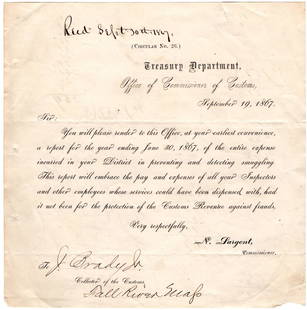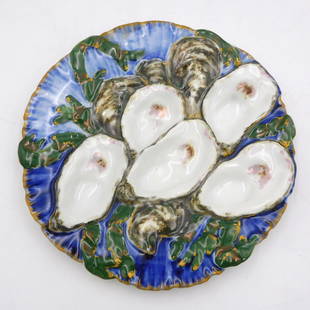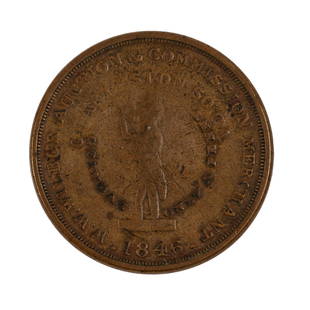

 Discovery- InteriorsBonhamsSponsored.Your ad here?
Discovery- InteriorsBonhamsSponsored.Your ad here?





 Discovery- InteriorsBonhamsSponsored.Your ad here?
Discovery- InteriorsBonhamsSponsored.Your ad here?




Treasury Department Instructs Massachusetts Collector of Customs
Similar Sale History
View More Items in Historical MemorabiliaRelated Historical Memorabilia
More Items in Historical Memorabilia
View MoreRecommended Collectibles
View More




Item Details
Description
Treasury Department Instructs Massachusetts Collector of Customs
Just days after the Army of the Potomac turned back Robert E. Lee's invasion of Pennsylvania at the climactic Battle of Gettysburg and the last Confederate bastion on the Mississippi River at Vicksburg fell to Union forces, the Treasury Department bureaucracy that funded the Union war effort continued with the routine details of monitoring trade with Union-occupied areas of the South. Treasury Department Special Agent Hanson A. Risley wrote to the collector of the port at Fall River, Massachusetts, about overdue reports.
Earlier in the spring of 1863, Acting Secretary of the Treasury George Harrington had sent the same collector guidance about granting permits for commercial intercourse with areas of states then in rebellion. The Treasury Department had determined that only Treasury officers in areas west of Pittsburgh could decide about interactions with the states in the western portions of the Confederacy. Throughout the Civil War, the Treasury Department had to maintain a delicate balance between trade that would encourage and strengthen Unionist elements in areas occupied by Union forces and trade that would benefit the Confederacy. It carefully monitored the sale of cotton to prevent such sales from providing the rebellious areas with much-needed gold and silver while also allowing northern merchants to buy and sell in war-ravaged areas under Union control.
[TREASURY DEPARTMENT.] Salmon P. Chase to Hiram Barney, Printed Letter Signed in Type, April 15, 1863; George Harrington to Charles Almy, Manuscript Letter Signed, April 24, 1863; Hanson A. Risley to Charles Almy, Manuscript Letter Signed, July 7, 1863. 3 pp., 8" x 10". General toning; pinholes on left margin from binding; strip of paper affixed to first page for binding.
Excerpts
Chase Letter, April 15, 1863
"I transmit herewith, for your information and government, a copy of Regulations concerning Internal and Coastwise Commercial Intercourse, prescribed by me March 31, 1863, under acts of Congress, approved, respectively, July 13, 1861, May 20, 1862, and March 12, 1863.
"The only officers of the Treasury Department at present authorized to grant permits for transportation and commercial intercourse with points in sections or districts heretofore declared to be in insurrection, west of the Allegheny mountains, are the Surveyors of Customs at Pittsburgh, Wheeling, Cincinnati, Madison, Louisville, New Albany, Evansville, Paducah, Cairo, Quincy, Saint Louis, and Memphis; and you will so inform parties applying for them."
Harrington Letter, April 24, 1863
"I transmit herewith copy of letter addressed to Hiram Barney, Esq. and enclosure, relative to Internal and Coastwise Commercial Intercourse, by which you will be governed as though addressed to yourself."
Risley Letter, July 7, 1863
"I have not received from you the ‘Abstract Statement' for the month of April, May, & June, required by the 10th Regulation Concerning internal & Coastwise Commercial intercourse. Please send me such abstract statement for each month, separate, & hereafter on the first of every month if you can."
Salmon P. Chase (1808-1873) was born in New Hampshire and studied law before establishing a law practice in Cincinnati, Ohio. He frequently defended fugitive slaves in court. He left the Whig Party for the Liberty Party in 1841 and helped create the Free Soil Party in 1848. He represented Ohio in the U.S. Senate from 1849 to 1855 and served as Governor of Ohio from 1856 to 1860. Abraham Lincoln appointed Chase as his first Secretary of the Treasury, a position he held from 1861 to mid-1864. In December 1864, Lincoln nominated Chase as Chief Justice of the U.S. Supreme Court, a position he held until his death.
Hiram Barney (1811-1895) was born in New York and graduated from Union College in Schenectady, New York, in 1834. He began practicing law in a series of firms in New York City. He supported the Free Soil Party and then the Republican Party. He represented New York Republicans in discussions with Abraham Lincoln about his Cabinet late in 1860. Lincoln appointed him as Collector of the Port of New York, a position he held from 1861 to 1864, when he resigned.
George Harrington (1816-1892) was born in Boston. He served as a clerk in the Treasury Department under Robert J. Walker from the 1840s. Later, his personal friend Salmon P. Chase promoted him to chief clerk and then Assistant Secretary of the Treasury during the Civil War. He served as an organizer of and a grand marshal in the funeral of President Abraham Lincoln. Harrington was the U.S. Minister to Switzerland from 1865 to 1869, and served as the president of the Automatic Telegraph Company in New York from 1870 to 1876.
Hanson Alexander Risley (1814-1893) was born in New York, attended Hamilton College, and studied law. He soon became a lifelong friend of William H. Seward. He began a law practice in Dunkirk in western New York, where he supported the development of several railroads. When his father was elected to Congress, Risley went to Washington with him. When he returned to New York, he served as county clerk and then served as Clerk of the New York Assembly at Albany in 1860. After serving briefly as U.S. consul to Jamaica in 1862, Risley served as a special agent of the Treasury Department for the rest of the Civil War. In 1875, he moved to Colorado, where he edited the Colorado Springs Gazette for several years.
Charles Almy (1819-1886) was born in Rhode Island and began teaching school at age 17. He later opened a country store but soon moved to Boston, where he became an auction and commission merchant. He participated in the business of whaling in New Bedford, Massachusetts, until the Civil War. He served as Collector of Customs at Fall River, Massachusetts, from 1861 to 1865. He joined the insurance business in 1864 and continued in that work until his death. Originally a Democrat, he became a Free Soiler in 1848 and then a Republican. In 1880, 1881, and 1882, he was the Prohibition Party candidate for governor.
This item comes with a Certificate from John Reznikoff, a premier authenticator for both major 3rd party authentication services, PSA and JSA (James Spence Authentications), as well as numerous auction houses.
WE PROVIDE IN-HOUSE SHIPPING WORLDWIDE.
Buyer's Premium
- 25%
Treasury Department Instructs Massachusetts Collector of Customs
Shipping & Pickup Options
Item located in Wilton, CT, usPayment

Auction Curated By



















![[Americana] [Shays's Rebellion] Partially-printed Commonwealth of Massachusetts Treasury Loan: [Americana] [Shays's Rebellion] Partially-printed Commonwealth of Massachusetts Treasury Loan Certificate A very rare loan certificate issued to pay for the suppression of Shays's Rebellion](https://p1.liveauctioneers.com/65/259470/135047469_1_x.jpg?height=310&quality=70&version=1661539042)
















![Hannibal Hamlin on His Calling Card Seeks Post at New York Customs House for Maine Native: Hannibal Hamlin[Washington, D.C.], ca. 1870Hannibal Hamlin on His Calling Card Seeks Post at New York Customs House for Maine NativeANSHANNIBAL HAMLIN, Autograph Note Signed, to "Mr. Terwilliger," on](https://p1.liveauctioneers.com/6306/327579/176471835_1_x.jpg?height=310&quality=70&version=1714074043)
![Massachusetts Whigs Rally Support for 1840 Campaign: Whig PartyBoston, MA, January 19, 1840Massachusetts Whigs Rally Support for 1840 CampaignPartially printed DS[WHIGS.] Elbridge G. Austin, Printed Circular Letter Signed, to Joseph S. Beals, January 19](https://p1.liveauctioneers.com/6306/327579/176471923_1_x.jpg?height=310&quality=70&version=1714074043)

![William McKinley Bold TLS on Ohio "Executive Department" Stationery Less Than 1 Week After His: William McKinley[Columbus, Ohio], November 13, 1893William McKinley Bold TLS on Ohio "Executive Department" Stationery Less Than 1 Week After His ReelectionTLSA 1p typed letter signed by fut](https://p1.liveauctioneers.com/6306/327579/176471617_1_x.jpg?height=310&quality=70&version=1714074043)


















![10 Days After His Assassination JFK Signed W. H. letter, Fantastic! Among JFK's Last Acts in White H: John F. Kennedy[Washington, D.C.], December 2, 196310 Days After His Assassination JFK Signed W. H. letter, Fantastic! Among JFK's Last Acts in White House Post Dated Before Dallas TripTLSJOHN F. KENN](https://p1.liveauctioneers.com/6306/327579/176471594_1_x.jpg?height=310&quality=70&version=1714074043)



















![George Washington Signed Discharge: Partly printed discharge document signed by George Washington, as Commander in Chief of the Armies of the United States. Newburgh, [New York], 4 January 1783. 1 page, ## x ## in. Undersigned by Washin](https://p1.liveauctioneers.com/7226/322253/173251475_1_x.jpg?height=310&quality=70&version=1710004847)

